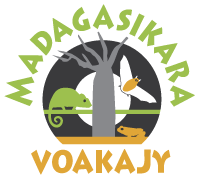
The Indri (Indri indri) and Diademed Sifaka (Propithecus diadema) are among the largest lemurs of Madagascar. Both are listed Critically Endangered on the IUCN Red List (Version 3.1) due to predicted population decline by 80% in the next 36-45 years caused by habitat loss and degradation and increasing hunting pressures. If Madagascar loses its lemurs, the country is likely to lose a major proportion of its income from ecotourism, while missing key ecosystem services provided by lemurs. It is therefore urgent to save the lemurs from extinction.
We are working to save the lemurs in Mangabe-Ranomena-Sahasarotra Reserve, in Moramanga District, Alaotra-Mangoro Region, eastern Madagascar. The key threats observed there are habitat loss and degradation from tavy, logging and small-scale mining, and hunting. Increase or decrease of these threats depends on people’s decisions for their livelihoods, especially those living close to the forest where lemurs survive. In this project, we particularly target youths who often did not pursue school education and are doomed to become farmers. Our challenge is to ensure they become lemur conservation ambassadors i.e. their agricultural practices will enhance lemur habitats and they will not hunt lemurs. In the future, we expect them to educate their children to adopt lemur-friendly farming techniques.
This project aims to educate and engage young people (14-30 years old) to adopt sustainable farming techniques to improve their livelihoods and reduce pressure on the forest, and to raise awareness for lemur conservation in their villages. Working in teams, youths will run sustainable farming demonstration plots, awareness campaigns and act for village-scale development. Individually, they will adopt farming techniques, receive training, and help other community members. Annually, we will evaluate achievement of the teams and the individuals. The top three teams and the top two individuals from the ten best teams will be rewarded with an educative trip outside Moramanga District. By the end of the project, we expect that emerging young leaders will drive the social dynamics at the communities within and around Mangabe, inspiring all community members towards sustainable development.
Since the project’s official launch in February 2019, we have been able to recruit 158 youths to join the project. They are based in 16 villages and form 16 groups. Between August and October 2019, they all received training on sustainable farming techniques and communication skills, defined the main supply chain they want to develop. Two groups chose fish farming, two chose beekeeping, two rice cultivation, six ginger and four selected beans cultivation. Based on these choices, we have provided each team targeted mentoring. In May 2020, the teams who cultivated rice did their first harvests. Yields ranged from 1.2 to 2.9 tons per hectare which are higher than the traditional 1 tons per hectare. To ensure continued and increased yields, the challenge is to convince youths to adopt crop rotation. For instance, one team who cultivated rice already agreed to cultivate beans in July – September.
Harvests for the other crops are expected in July and August. Due to the Covid-19 pandemic, we were not able to start the fish farming project and to assist the youths as planned in the field. Nonetheless, we have been able to meet with youths’ representatives and are maintaining communications by phone. We expect youths’ leaders to help spreading information about the Covid-19 prevention in the villages since the training they received in May 2020.
This project is funded by IUCN Save Our Species (https://www.saveourspecies.org/ ).
).
The contents of this article are the sole responsibility of Madagasikara Voakajy and do not necessarily reflect the views of IUCN.



